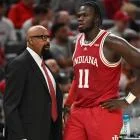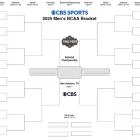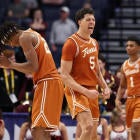You either believe Rick Pitino, at this point, or you don't. Simple as that. So there was never going to be anything he could write in a book published Tuesday -- it's called "Pitino: My Story" -- that would move anybody from one side of the debate to the other. I hope he knew that going in. I trust that he did.
You either believe he knew or he didn't.
You either believe he was involved or he wasn't.
And the unfortunate reality for Pitino is that, even with 280 pages, he never stood a chance of flipping his detractors because, even if Pitino is innocent in every way, there's literally no way for him to prove it. That's the impossible position this Hall of Fame coach still finds himself in. And he'll likely never escape that position regardless of whether he coaches again or not.
"My coaching career is possibly finished," Pitino writes in the book. And he might be correct -- although it should be noted that when Matt Norlander and I polled more than 100 college coaches last month, the majority predicted he will someday coach again.
Time will tell, I suppose.
Obviously, if one of the Adidas executives facing federal charges ends up testifying that Pitino was aware of an agreement to send $100,000 to Brian Bowen's family in exchange for the McDonald's All-American's enrollment at Louisville, that's game-set-match. But, for what it's worth, Pitino has always denied such was the case. He did so again in the book. You either believe him or you don't.
As for me, I've always believed Pitino knew nothing about the stripper parties thrown by Andre McGee, if only because it's nonsensical to think he would've known and allowed them to happen on campus in a dorm with security cameras everywhere. No head coach is that stupid. So what I've forever insisted is that even if Pitino would've been aware of, and condoned, major NCAA rules violations happening within his program, there's just no way he would've allowed them to happen in this way in that dorm.
But the Brian Bowen situation is a different deal.
Rick Pitino is a brilliant man.
He's not naive. He knows how recruiting works. So he must understand that when you get a text message in May 2017, basically out of nowhere, from a shady character like Christian Dawkins asking if you'd be interested in a five-star prospect, it's unreasonable to not assume something is up -- especially when the five-star prospect with whom you have no real relationship is visiting you on his own dime in a matter of days and committing to you in less than a month. That's a red flag if there's ever been a red flag.
Here's how Pitino initially described Bowen's recruitment: "We got lucky on this one. I had an AAU director call me and ask me if I'd be interested in a great player. I saw him against another great player from Indiana. I said, 'Yeah, I'd be really interested.' They had to come in unofficially, pay for their hotel, pay for their meals. We spent zero dollars recruiting a five-star athlete who I loved when I saw him play. In my 40 years of coaching, this is the luckiest I've been."
Nobody is that lucky in high-stakes recruiting. In fact, the only other time I can remember a coach explaining how he got a call out of nowhere from somebody asking if he'd be interested in a five-star prospect, it was Tim Floyd discussing USC's signing of O.J. Mayo. And remember how that turned out? It's like that old saying goes: If it seems too good to be true, it probably is.
Brian Bowen was too good to be true.
Rick Pitino, at the very least deep down, must've known that. And I write this as somebody who respects and likes Pitino very much. I'm not here to pile on. I just think it would be nearly impossible, even if you're not directly involved, to get that call from Christian Dawkins, and that commitment out of nowhere, without thinking a shoe company or agent or assistant or somebody had done a deal in violation of NCAA rules.
Still, the question remains: Was Pitino actually involved?
At Louisville, the administration quickly decided it didn't really care because, if nothing else, Pitino had yet another staff member caught in yet another major recruiting scandal, according to FBI documents. That much was undeniable and enough to push the school to remove him just weeks before what would've been the start of his 17th season. There's no undoing that now. But Pitino's legacy, and his desire to coach again, remain tied, to some degree, to that question above: Was Pitino actually involved? And I think the best reasonable answer to that question is that if Pitino really wasn't involved it's probably only because he went way out of his way to not be involved.
The term is willful blindness.
Which, by the way, isn't uncommon in this profession.
Coaches have for decades covered their eyes and ears and declined to ask questions they otherwise might in an attempt to be able to honestly say what Pitino is still saying today -- that they didn't know this thing got done this way. Trust me when I tell you, there are coaches still working at the high-major level who have similarly benefitted from shoe-company involvement, and those coaches have either directly been involved in the deals or made it known they don't want to know anything about any deals. One or the other. But none of them are so naive that they don't know when they secure a commitment under unusual circumstances via outside influences.
That's what I think, at least.
And it's why I completely understand why an athletic director would be hesitant to hire Pitino but also totally get why this entire ordeal is so frustrating for him. He's one of the greatest college basketball coaches of all-time and yet unemployed because his program got caught using a shoe company to enhance recruiting, which is something other programs have long done. Rest assured, this type of transaction did not start with Adidas and Louisville. It might stop there. But it definitely didn't start there.
Pitino's new book doesn't make that point.
But I'm comfortable making it for him.
And yet, ultimately, none of it matters much. As Pitino has acknowledged many times, he was responsible for everything that happened in Louisville's program on his watch, and too many bad things happened in Louisville's program on his watch. A big scandal so soon after another big scandal was never going to be survivable. The only question left is whether Pitino is telling the truth when he continues to insist he didn't know anything about anything. Unfortunately, it's possible we'll never have a clear-picture of that, which means this could forever be a his-word-against-the-perception thing. And if that's the way it plays out, then you'll either believe him or you won't. But, at this point, there's not really anything he can say or write that'll change anybody's mind in either direction.
![[object Object] Logo](https://sportshub.cbsistatic.com/i/2020/04/22/e9ceb731-8b3f-4c60-98fe-090ab66a2997/screen-shot-2020-04-22-at-11-04-56-am.png)


















